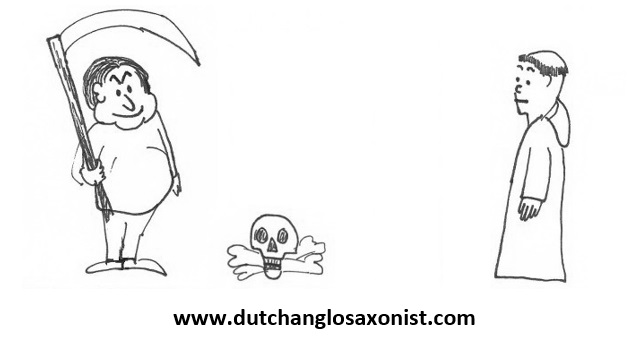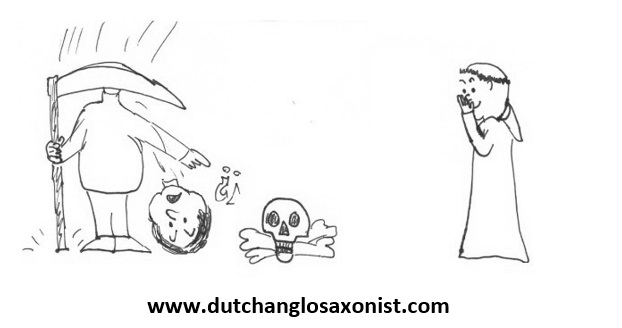Alfred and the cakes, Cnut and the waves, and Eadmer the flying monk: Anglo-Saxon history is full of anecdotes. On this blog I will regularly highlight some amusing and/or remarkable episodes from early medieval England, along with a selfmade cartoon. This blog discusses the time when a peasant beheaded himself.
The Vita S. Ecgwini (VSE) is an account of the life of Ecgwine, bishop of Worcester (?693–717) and founder of Evesham Abbey. The Latin text has been dated to after the year 1016 and is ascribed to the Anglo-Saxon monk and scholar Byrhtferth of Ramsey. This saint’s life is full of miraculous tales, including the story of how a long-lost key was found in the innards of a fish, and the story of how a farmer had a vision of Mary in the hiding place of his sow. The tale that struck me most, however, was the tale of the Anglo-Saxon peasant that beheaded himself.
Off with my head!
One day, a certain peasant, “fattened on worldy wealth” (VSE, iv. 10, trans. Lapidge 2009), claimed a substantial part of the land which belonged to the monastery of Evesham. Wigred, the prior of that same monastery, decided that the matter would be settled by having both the peasant and himself claim the land by means of an oath on the relics of Saint Ecgwine. The relics were placed in the middle of the land which both the prior and the peasant claimed to own:

When the peasant came forward to swear his oath, he felt quite confident, since he “had craftily taken a bit of dirt from his own dwelling and put it – at the devil’s instigation – in his shoe. […] He sought to act fraudulently to this end, that through this soil he might be able to swear that he was standing on his own land” (VSE, iv. 10, trans. Lapidge 2009). A nice trick!

Before swearing his oath, the peasant confidently raised up his weapons in the air. That’s when God intervened:
That madman was in utter rage; he even raised up his weapons and his arrogant right hand, with which he intended to fix fiercely in the ground the scythe which he was carrying in his hand; but the just judge did not wish it so: “He directed the suffering on to his head, and the malice on to his skull” [cf. Psalm 7:17]. That rascal fixed the shaft of the scythe so strongly in the ground that with the one blow he cut off his own foul head and neck – not making of himself a martyr for Christ’s love, but dismissing himself from this life, the devil gaining the victory. (VSE, iv.10, trans. Lapidge 2009)

And that’s how a greedy peasant lost his own head so that the monks of Evesham could hold on to the land that was rightfully theirs.
If you liked this post, you may also enjoy:
- An Anglo-Saxon Anecdote: Dreaming of witch-wives, fiery pitchforks and the Battle of Fulford
- An Anglo-Saxon Anecdote: The Battle of the Birds, 671
- An Anglo-Saxon Anecdote: How beer and bees beat the Viking siege of Chester in c. 907
- An Anglo-Saxon Anecdote: Earl Siward and the Proper Ways to Die
- An Anglo-Saxon Anecdote: The Real Night of the Long Knives
- An Anglo-Saxon Anecdote: How Hengest was led by the nose
- An Anglo-Saxon Anecdote: Alleluia, the Anglo-Saxon Boo!
Stay tuned for more illustrated Anglo-Saxon anecdotes in the future!
References:
- Lapidge, M., ed. and trans., Byrthferth of Ramsey: The Lives of St. Oswald and St. Ecgwine (Oxford, 2009).

Interesting story. Worse than shooting yourself in the foot!
My late father-in-law, Candido, who came from a traditional Ladino village in the Italian Alps, also had a story about putting earth in your shoes before swearing an oath. In his version, generations ago, representatives of another village falsely swore that they owned a field which really belonged to Candido’s village. They put soil from their own land in their clogs and swore that they stood on their own earth. Either this trick was notorious throughout Europe, or it may have been one of these stories which was swapped between mediaeval hagiographies.
LikeLiked by 3 people
Interesting! Yes, must be one of these folkloric motifs that pop up in various cultures; like the ring/key found in the innards of a fish.
LikeLike
Cutting your own head off is unusual. I’m trying to think of other tales (any time, any place) where this has occurred. Maybe that says something about the sanctity of heads?
Here in New Zealand (and other parts of the South Pacific) heads are tapu. You shouldn’t touch someone’s head without permission. I’m of European descent, but I always feel shocked if (for example) I see someone reach out unthinkingly and ruffle a kid’s hair.
LikeLike
The beheading game is a common element in medieval myths, like Sir Guwain and the green knight, etc., but I don’t think that’s what’s going on here.
LikeLiked by 2 people
A peasant and a prior are in a land dispute. They agree to meet out there to resolve the dispute, where the peasant accidently beheads himself thus proving the prior rightfully owns the land… uh huh.
LikeLiked by 1 person